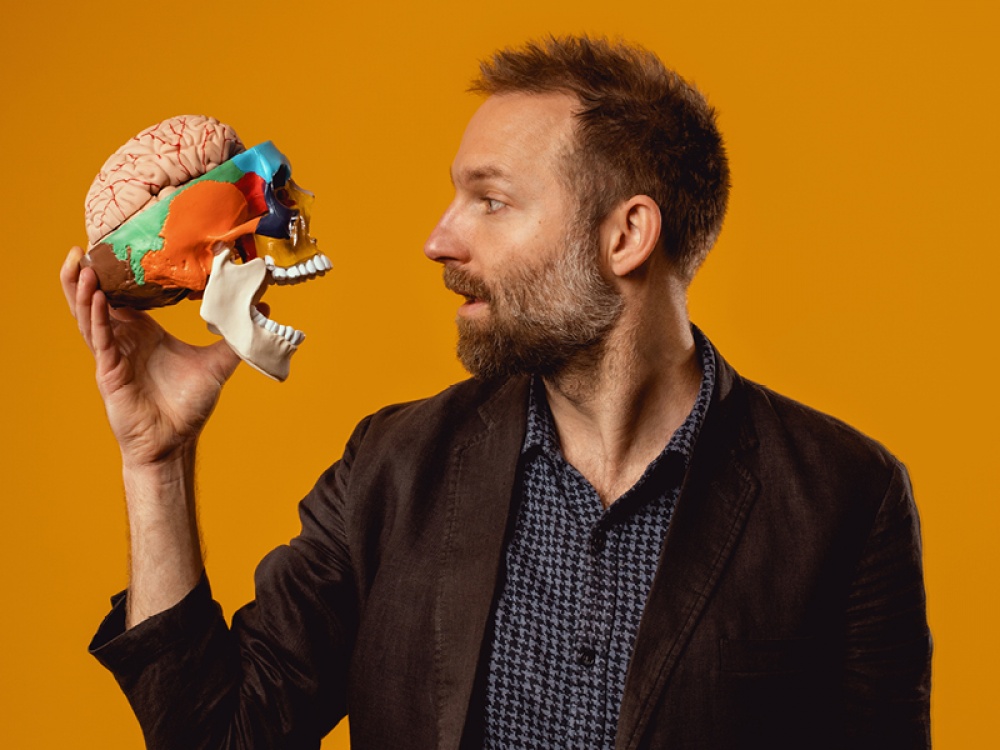Meet Benji Waterhouse: NHS Psychiatrist, Stand-up Comedian and Now Published Author

How do you cope in a career that involves spending your days with people experiencing the darkest moments of their lives? For psychiatrist, stand-up comedian, turned writer Benji Waterhouse the answer was simple: (try) to keep it light
‘Inherently funny things just do happen in psychiatry just as they do in all jobs,’ he continues, offering, as an example, the time he was so tired he wrote his own name instead of the patient’s on some sectioning papers (luckily he noticed the mistake before it was too late).
His new book, You Don’t Have to be Mad to Work Here, is a memoir that finds the humour in moments like these, whilst offering an earnest exploration of Benji’s experience of mental health; both professionally and personally.
A recurring theme, both in the book and our conversation, is that when it comes to mental health there’s no such thing as a quick fix. ‘I’ve got this joke that I used to do in stand-up,’ Benji begins, ‘Whenever they discover my job, [people] ask: “What’s the secret to happiness?”

‘I say to them: “It’s simple. All you need is a healthy birth, secure attachment, happy childhood, no trauma, high resilience, loving friends, family and partner, fulfilling work, financial security, manageable targets, eight hours’ sleep, regular exercise, healthy diet, moderate drugs, alcohol and social media, plus or minus antidepressants, therapy and 100 percent charge on your phone.”’
This complexity extends to the business of diagnosis. ‘Even though these things have words and labels and names now, the difference between the body and the mind when talking about mental illness is that it’s still so mysterious,’ Benji explains. ‘There’s no blood test for depression, or X-ray for anxiety, you can’t put a stethoscope to someone’s forehead to hear the voices.’
The cause of mental illness might be unclear, but the impact of the illnesses the book describes, from schizophrenia to bipolar, alcoholism and personality disorders are severe. ‘There is this very welcome mental health conversation now, but it does tend to focus on the milder, more palatable end of the spectrum,’ he says. ‘I wanted to give a voice to people with more serious mental illness. Those people for whom some mindful colouring in and cold-water swimming doesn’t do very much.’
Benji began writing the book as part of a creative writing course in lockdown, and although it is a memoir, confidentiality was still paramount. ‘The characters in the book are really just amalgams of all the patients that I’ve tried to help in my career,’ he explains, ‘but I hope that they feel real. Real living, breathing people who also sometimes try to destroy themselves like everyone else.’
One character who has not been anonymised is Benji himself. He is unflinchingly honest about the brutally utilitarian logic required to allocate limited resources and beds, his own struggles with mental health and his experience of therapy. The latter often leads him back to his childhood in Northumberland.
‘I had a very loving but slightly complicated home life which was sometimes a bit dysfunctional,’ he says, describing what first drew him to a career in psychiatry. ‘I guess my parents sometimes struggled to be happy and I think I had this fantasy I might get the secret code to fix my family. I got there and realised there aren’t really any codes.’
The book begins with Philip Larkin’s famous poem about children and their parents, and he spends time exploring how the volatility of his own parents’ relationship affected him. At the same time, the book is dedicated to his parents, and it’s clear that their difficulties existed in tandem with a deeply loving family dynamic. I wonder how Benji’s family reacted to the book?
‘I have always been lucky to be very close to my family,’ he says. ‘My brothers have always been supportive, but admittedly my parents have found it harder. They’re from that different generation, who historically have dealt with problems by never ever talking about them. I think they’ve seen now that the world doesn’t necessarily end if you do.’ It’s testament to their continued closeness that they were first in line for his first event at this year’s Hexham Book Festival.
Following on from the success of his first book (which he is now adapting for television) Benji is planning another, which he says will explore illnesses not covered in the first memoir. He’ll be road-testing stories from the new book at the Edinburgh Fringe throughout August.
You Don’t Have to Be Mad to Work Here by Benji Waterhouse: A Psychiatrist’s Life, £18.99 Penguin







